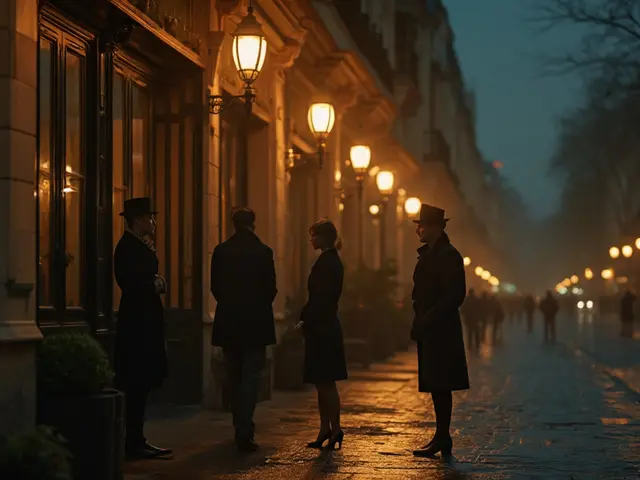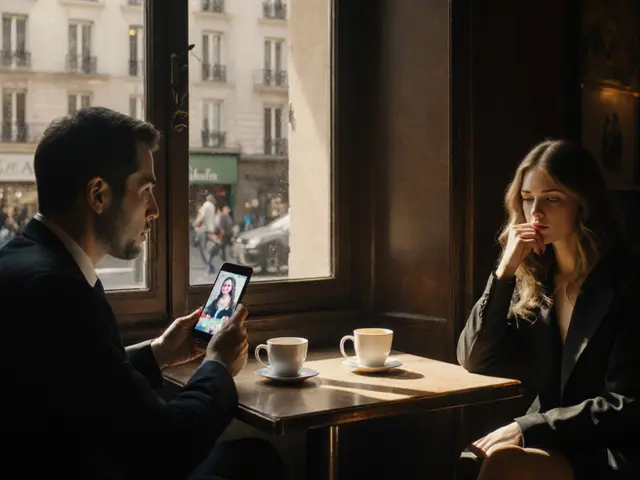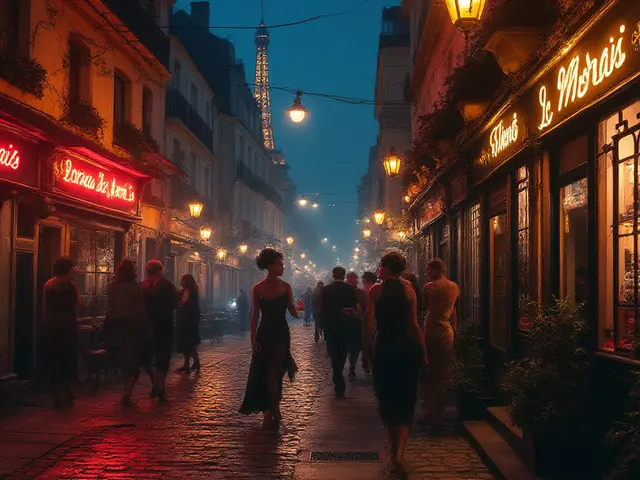The Most Iconic Movies and Books Featuring Escorts in Paris
Paris has long been a canvas for stories about desire, survival, and illusion-and few characters embody that tension like the escort. Not the caricatures of cheap thrillers, but the complex, often heartbreaking figures who move through the city’s shadows and spotlight alike. These aren’t just side characters. They’re the emotional anchors of some of the most powerful films and novels set in Paris. If you’ve ever wondered why Paris keeps showing up in stories about sex work, it’s because the city doesn’t judge-it observes. And in its quiet alleys and candlelit bistros, escorts become symbols of freedom, exploitation, resilience, and truth.
Amélie: The Escort Who Wasn’t There
Amélie (2001) isn’t about an escort. But it’s one of the most honest portrayals of how Paris sees them. The scene where Amélie imagines the life of a lonely man who watches his neighbor through a telescope? That man is a retired escort who once served wealthy women in the 1960s. He doesn’t speak. He doesn’t need to. The film shows him folding laundry, sipping coffee, and staring out the window. No drama. No redemption arc. Just quiet dignity. Director Jean-Pierre Jeunet didn’t make him a villain or a saint. He made him human. That’s rare. Most films reduce escorts to plot devices. Amélie treats them as people who lived, loved, and left-without fanfare.La Piscine: Lust, Power, and the Woman Who Refused to Be Owned
In La Piscine (1969), Alain Delon plays a wealthy playboy who invites his ex-lover and her daughter to his villa on the French Riviera. But the real star is the woman he left behind: Marianne, played by Romy Schneider. She’s not an escort, but she behaves like one-flirting, manipulating, seducing, and then walking away. The film drips with unspoken transactions. Money? Yes. But also attention, validation, control. The real escort in this story? The system that turns love into a contract. Critics called it a thriller. But it’s really a portrait of how Parisian elites used women like Marianne-not as servants, but as mirrors of their own emptiness.Madame Bovary: The Original Parisian Escort
Gustave Flaubert’s Madame Bovary (1857) is often called the first modern novel. But it’s also the first great novel about a woman who traded intimacy for survival. Emma Bovary isn’t a streetwalker. She’s a middle-class wife who turns to affairs to escape her dull life in provincial France. But when she moves to Paris, her affairs become transactions. She borrows money from lovers, buys luxury goods on credit, and uses sex as currency. The novel was banned for obscenity. But Flaubert wasn’t writing about sin-he was writing about capitalism. Emma’s downfall wasn’t lust. It was debt. And in Paris, where romance is sold as a product, she was just early to the market.Lost in Translation: Paris Edition
No, Lost in Translation isn’t set in Paris. But Sofia Coppola’s 2003 film about a lonely actress in Tokyo? That’s the blueprint for Paris, Je T’aime (2006). One segment, Quartier de la Madeleine, features a young American woman (played by Natalie Portman) who works as a high-end escort. She meets a wealthy older man who pays her to talk. Not to sleep with him. Just to talk. About his dead wife. About his regrets. About how lonely Paris can be. She doesn’t say much. She listens. And that’s what he pays for. The segment lasts less than ten minutes. But it’s one of the most truthful depictions of escort work ever filmed: not about sex. About silence. About the human need to be heard-even if you’re being paid to do it.The Female Client: A Novel That Broke the Mold
In 1996, French author Jean-Patrick Manchette published The Female Client-a noir thriller that flips the script. The protagonist isn’t a detective. She’s a former escort who becomes a private investigator. She doesn’t wear stilettos and red lipstick. She wears boots, a trench coat, and a cold stare. She’s not looking for love. She’s looking for justice. The book doesn’t romanticize her past. It doesn’t punish her for it. It treats her like a professional who knows the streets better than the police. Manchette wrote this in the 1990s, when most French novels still painted escorts as tragic victims. He saw them as survivors. And in doing so, he created one of the first female antiheroes in French crime fiction who wasn’t defined by her sexuality.Call Me by Your Name… in Paris
No, Call Me by Your Name isn’t about an escort. But the 2017 film’s emotional core-how people use intimacy to fill a void-is exactly what drives the best Paris escort stories. In Paris, 13th District (2021), director Jacques Audiard follows three people connected by a dating app. One is a university student who becomes an escort to pay rent. Another is a middle-aged man who pays her to pretend she’s his daughter. Their relationship isn’t transactional. It’s tender. He doesn’t touch her. She doesn’t ask for more. They just sit together. Watch old movies. Eat croissants. The film doesn’t explain why. It doesn’t need to. In Paris, sometimes the most dangerous thing isn’t sex. It’s connection.Why Paris? Why Now?
Paris doesn’t have more escorts than London, New York, or Tokyo. But it has more stories. Why? Because Paris sells itself as the city of love. And love, in Paris, is never free. It’s always for sale-whether you’re buying a painting, a bottle of wine, or a night with someone who knows how to listen. The city’s history of art, literature, and revolution made it the perfect stage for stories about people who sell intimacy to survive. Today, with rent at €2,500 a month for a studio and wages frozen since 2019, more women-and men-turn to escorting not as a choice, but as a calculation. And the stories that come out of it? They’re not about glamour. They’re about survival.What These Stories Get Right
The best films and books about escorts in Paris don’t glorify. They don’t condemn. They show the quiet moments: the way a woman counts cash in a dimly lit kitchen. The way a man stares at his reflection after paying for a night. The way a book is left on a nightstand-The Great Gatsby, Les Misérables, Madame Bovary-as if the character is trying to remember who they were before the transaction began. These stories work because they’re not about sex. They’re about loneliness. About the cost of being seen. About how Paris, with all its beauty, can make you feel more alone than anywhere else.What They Get Wrong
Too many films still treat escorts as either angels or devils. In Pretty Woman, a woman becomes a princess. In Basic Instinct, she’s a killer. Neither is true. Real escorts in Paris don’t end up rich. They don’t die tragically. They just keep going. They get up. They take the metro. They pay their bills. They read the news. They miss their mothers. They don’t want to be in the movies. They just want to be left alone.Where to Find the Real Stories
If you want to understand escorts in Paris, skip the films. Read Les Enfants du Siècle by Barbara Grünthal. Or La Vie de Cour by Émilie de Turckheim. Both are based on real interviews with women who worked in Paris between 1980 and 2010. Or listen to the podcast Paris After Dark-a series of unedited voice recordings from women who worked in the 13th arrondissement. No music. No narration. Just their voices. That’s the real Paris.Are the escort characters in these films based on real people?
Some are. Characters in Paris, 13th District and The Female Client were inspired by real interviews with women who worked in Paris during the 1990s and 2000s. Others, like the escort in Amélie, are fictional but grounded in real patterns-like the retired escorts who lived quietly in the 14th arrondissement after leaving the trade. Filmmakers like Jacques Audiard and Jean-Patrick Manchette spent months talking to women before writing their stories.
Is escort work legal in Paris?
Yes and no. Selling sex is not illegal in France. But buying it is. Since 2016, clients can be fined up to €1,500. Brothels are banned. Advertising is illegal. So while the work itself isn’t a crime, the environment makes it dangerous. Many escorts now work through apps or private appointments, avoiding street work entirely. The law was meant to protect women. But many say it just pushed them deeper into isolation.
Why do so many Paris escort stories focus on loneliness?
Because loneliness is the real currency. In Paris, where social connections are often transactional, escorts are the only people who are paid to be present. Not to perform. Not to seduce. Just to sit with someone who’s afraid to be alone. Films like Paris, Je T’aime and Paris, 13th District show this clearly: the clients aren’t looking for sex. They’re looking for silence. And the escorts? They’re looking for dignity. That’s why these stories feel so raw-they’re about two people who need each other, but can’t say it out loud.
Are there any male escorts featured in these stories?
Rarely. Most films and books focus on women, partly because of gendered assumptions about sex work. But male escorts exist in Paris-especially in the 8th and 16th arrondissements. They’re rarely shown because the stories don’t fit the romantic or tragic mold audiences expect. One exception is the 2020 documentary Les Hommes de la Nuit, which follows three male escorts over six months. Their stories are quieter, less dramatic, but just as complex.
What’s the biggest myth about escorts in Paris?
That they’re all glamorous or desperate. The truth? Most are ordinary people trying to pay rent, support family, or finish school. One woman I spoke to worked as an escort while studying law at Sorbonne. Another paid for her daughter’s braces. They don’t wear designer clothes. They don’t drive luxury cars. They take the metro. They eat at the same boulangerie every morning. The myth of the Parisian escort as a seductress? That’s for tourists. The real ones? They’re invisible.
What to Watch or Read Next
If you want to go deeper:- Watch: Paris, 13th District (2021) - the most honest portrayal of modern escort life in the city
- Read: Les Enfants du Siècle by Barbara Grünthal - oral histories from women who worked in Paris from 1980-2010
- Listen: Paris After Dark podcast - raw, unedited voices from women in the 13th arrondissement
- Read: The Female Client by Jean-Patrick Manchette - the novel that changed how France saw sex work
- Watch: Amélie (2001) - not about escorts, but the most respectful depiction of their hidden lives
Paris doesn’t need more movies about escorts. It needs more people who see them-not as characters, but as neighbors.





